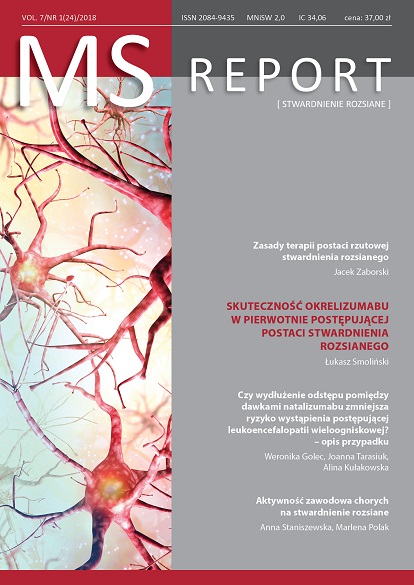Professional activity of patients with epilepsy with multiple sclerosis Original article
Main Article Content
Abstract
Background: The multiple sclerosis disrupt every area of the patient’s life, including the professional activity.
Aim: The aim of the study was to determine the occupational activity of patients with multiple sclerosis. Particular attention was paid to employment of patients, and the way the workplace is informed about the disease.
Material and methods: Participants were recruited through multiple channels, including online websites, a forum for people suffering from multiple sclerosis, and from a neurological outpatient clinic in Warsaw, and asked to fill in a customized questionnaire, containing questions on their socio-demographic, clinical and employment status.
Results: The study included 50 adult patients with multiple sclerosis (30 professionally active and 20 inactive). The study shows that the most frequently experienced signs of multiple sclerosis in the study group were fatigue (18%), visual disturbances (14%) and pain (14%). As many as 86% respondents had revealed the disease at work.
Conclusions: Multiple sclerosis is a great obstacle to finding and maintaining employment. The attitude of employers towards the problem of people with MS, adapting the working conditions and the acceptance of patient, has an important impact on the patients’ ability to continue working.
Article Details
Copyright © by Medical Education. All rights reserved.
References
2. Odrobińska I. (red.): MS i… najważniejsze fakty: podstawowe informacje o stwardnieniu rozsianym. Zeszyt 1. Polskie Towarzystwo Stwardnienia Rozsianego, Warszawa 2010.
3. Krajewski S., Garczyński W., Zawadka M. et al.: Aktywność zawodowa chorych na stwardnienie rozsiane. Hygeia Public Health 2014; 49(1): 134-141.
4. Przychodzka E., Lorencowicz R., Turowski K. et al.: Funkcjonowanie społeczne i zawodowe pacjentów z SM. Zdrowie i Dobrostan 2013; 4: 213-233.
5. Messmer U.M., Specchia C.M., Battaglia A.: Factors that influence the employment status of people with multiple sclerosis: a multi-national study. J. Neurol. 2009; 256(12): 1989-1996.
6. Dworzańska E., Mitosek-Szewczyk K., Stelmasiak Z.: Zespół zmęczenia w stwardnieniu rozsianym. Neurol. Neurochir. Pol. 2009; 43(1): 71-76.
7. Mumenthaler M., Mattle H., Podemski R. et al.: Neurologia. Edra Urban & Partner, Wrocław 2005.
8. Sierakowska M., Krajewska-Kułak E.: Jakość życia w chorobach przewlekłych. Nowe spojrzenie na pacjenta i problemy zdrowotne w aspekcie subiektywnej oceny. Pielęgniarstwo XXI wieku 2009; 2: 27-30.
9. Prusiński A.: Neurologia kliniczna. Wydawnictwo Lekarskie PZWL, Warszawa 2005.
10. Grochans E., Wieder-Huszla S., Jurczak A. et al.: Ocena wsparcia społecznego pacjentów ze stwardnieniem rozsianym. Probl. Hig. Epidemiol. 2008; 89(3): 419-422.

